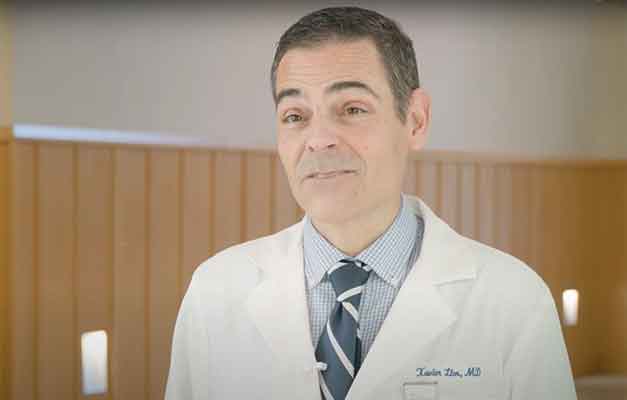
Popular Locations
- Smilow Cancer Hospital
- Smilow Cancer Hospital Care Center - North Haven
- Smilow Cancer Hospital Care Center - Park Avenue Medical Center

The Smilow Screening and Prevention Program brings together doctors and researchers at Smilow Cancer Hospital and Yale Cancer Center who are focused on merging the best science with the best cancer prevention and screening programs. Our goal is to provide patients throughout Connecticut with the tools they need to stay healthy.
Smilow Cancer Hospital
Yale New Haven Hospital
Smilow Cancer Hospital
Cancer screening tests offered through the Smilow Screening and Prevention Program:
Gastrointestinal cancer screenings offered through Digestive Health Services:
Cancer refers to a group of diseases that share a common characteristic: the loss of cell growth control. Cancer cells behave differently from healthy cells, and can cause many serious health problems for the patient. Cancer has many forms and affects patients in many different ways. Cancers can arise from any organ or body tissue. Cancer growth is composed of tiny cells that have lost the ability to stop growing. In most cases, cancer is not caught until a patient has signs and symptoms and seeks help for his/her symptoms. When a cancer is in its earliest stage, before signs or symptoms arise, it is most amenable to treatment, providing the best chances for cure.
Cells grow abnormally because the damaged genes have lost their ability to control cell growth and perform their intended role in the body. We do not always know what is responsible for these malfunctioning genes. However, it has proven that factors such as smoking or excessive alcohol use are associated with the development of several types of cancer.
Cancer Screening is the use of clinical tests to detect cancer at its earliest stage before there are signs and symptoms of the cancer. Currently, effective screening tests do not exist for every type of cancer. However, there are tests to screen for several of the most common cancers and for cancers associated with the highest death rates. Medical science has developed many safe and effective screening tests. For example, there are mammograms to detect early stage breast cancer and colonoscopy to detect early stage colon cancer.
Cancer Screening is not always straightforward. There may be decisions about when to perform screening and the most appropriate tools for each person. You should speak with your doctor or medical care provider to help you make decisions about cancer screenings.
The Smilow Screening and Prevention Program engages physicians, nurses, social workers, healthcare administrators, and Community Health Educators in a coordinated effort to both identify cancer in its earliest stage and to educate, encourage, and reinforce behaviors that can prevent cancer from occurring. We will also assess if you are at risk for an inherited cancer syndrome and recommend the appropriate tests to find out if actually you do have a genetic predisposition that causes cancer. If so, we will discuss the best plan prevent cancer or detect cancer development as early as possible.
There are many individual and general risk factors for developing cancers. The best way to determine if you should be screened and which screening tests are right for you is to talk to your doctor about your health and your personal risk factors for cancer. Some tests are specific to your gender, some specific to your family history, and some related to your health related behaviors. Together with your physician or health care provider, you will identify what is right for you.
There are many individual and general risk factors for developing cancers. The best way to determine if you should be screened and which screening tests are right for you is to talk to your doctor about your health and your personal risk factors for cancer. Some tests are specific to your gender, some specific to your family history, and some related to your health related behaviors. Together with your physician or health care provider, you will identify what is right for you.
Risk factors for cancer vary from person to person. They might be due to exposures that occur throughout a person’s life; e.g. smoking, pesticides, alcohol, a poor diet, or other chemicals. They may also be related to a familial risk for a specific cancer; e.g. certain breast cancers or some colorectal cancers. Age is probably is the most common risk factor. As people get older, the likelihood of developing cancer rises.
Yale New Haven Hospital offers breast and cervical cancer screening; as well as heart healthy services for uninsured and underinsured women.
As part of the Connecticut Breast and Cervical Cancer Early Detection Screening Programs (CBCCEDP), Yale New Haven Hospital is one of the sites in Connecticut offering a comprehensive breast and cervical cancer screening program for medically underserved women. Services such as mammograms, clinical breast exams and Pap smears are offered free of charge for eligible women over age 40.
Yale New Haven also offers the WISEWOMAN (Well-Integrated Screening and Evaluation for Women Across the Nation) Project. WISEWOMAN assesses risks of heart disease and provides preventive health services to medically underserved women. Connecticut is one of only seven states to adopt WISEWOMAN, with YNHH as one of the nine sites in the state to administer the program.
For more information on these programs, please call 203-688-2219 or 203-867-5436.
Who should be screened for Breast Cancer?
For women who are at average risk for breast cancer
As you may have heard, the American Cancer Society recently changed their recommendations for breast cancer screening. However, many other medical organizations, such as the American College of Radiology, the Society of Breast Imaging, and the American College of Obstetrics and Gynecologists continue to recommend annual screening mammography starting at age 40. Because the risks and benefits of cancer screening depend on a number of individual factors such as your age, medical history, race and/or ethnicity, family history, and breast density, doctors at Smilow continue to recommend annual screening mammograms beginning at age 40 for most average risk women. However, you should discuss the screening schedule that is best for you with your health care provider.
For women at higher than average risk
Women who are at an increased risk for breast cancer due to strong family history or certain other risk factors should discuss the option of screening MRI with their physician. These women should also continue with annual mammograms. For more information, see below: Who should have an MRI?
It is generally recommended that all women be familiar with the normal look and feel of their breasts and report any changes to their doctor or health care provider right away.
What tests are available through the Smilow Screening and Prevention Program?
Mammograms and other breast imaging tests are available at Smilow Cancer Hospital. However, you can also get these tests at the Long Wharf facility at Sargent Drive in New Haven, at Devine Street in North Haven, and at the Shoreline Medical Center in Guilford as well as through our mobile mammography service.
If MRI is used, it should be in addition to, not instead of, a screening mammogram. This is because although an MRI is a more sensitive test (it’s more likely to detect cancer than a mammogram), it may still miss some cancers that a mammogram would detect.
For most women at high risk, screening with MRI and mammograms should begin at age 30 years and continue for as long as a woman is in good health. But because the evidence is limited about the best age at which to start screening, this decision should be based on shared decision-making between patients and their health care providers, taking into account personal circumstances and preferences.
Adults aged 55 to 80 years who have a 30 pack year smoking history and currently smoke or have quit within the past 15 years. One pack year = smoking one pack per day for one year; 1 pack = 20 cigarettes. Screening should be discontinued once a person has not smoked for 15 years.
Examples:
What tests are available through the Smilow Screening and Prevention Program?
Who should be screened?
Prostate cancer is the most commonly occurring cancer in men. Whether or not a man should undergo screening for prostate cancer is an important decision. Because research has not yet proven that the potential benefits of testing outweigh the harms of testing and treatment, doctors at Smilow believe in a shared decision making approach in which the decision to screen should be made between a man and his health care provider. This decision should be made after an informed discussion of the risks and benefits of prostate cancer screening, taking into consideration a man’s age, race/ethnicity, health status and family history of prostate cancer. Because some men may be at higher than average risk, it is important that you discuss your risk status with your doctor.
Men at Average Risk:
Men in their 40’s: Doctors at Smilow feel that all men regardless of their known risk factors should have an opportunity to have a baseline PSA as this may help inform the discussion and decision about future screening.
At age 55: Men who are at average risk of prostate cancer should talk to their doctors about routine screening for prostate cancer. Doctors at Smilow agree with some professional organizations that biennial (every 2 years) screening may be adequate in this age group, as long as an initial age-adjusted PSA test was normal.
Over the age of 69: Doctors at Smilow recommend an individualized approach to screening that takes into consideration the man’s general health and life expectancy. It should be noted that some professional organizations do not support screening men in this age group.
Men at Greater than Average Risk:
At age 40, men who are at increased risk of prostate cancer should talk to their health care provider about prostate cancer screening.
This includes:
What tests are available through the Smilow Screening and Prevention Program?
If you decide to be tested, doctors at Smilow recommend both a PSA blood test and a rectal exam. How often you’re tested will depend on your PSA level.
According to the American Cancer Society most skin cancers are caused by too much exposure to ultraviolet (UV) rays. Some of this exposure may come from man-made sources, such as indoor tanning beds and sun lamps, but most of this exposure comes from the sun.
Some people think about sun protection only when they spend a day at the lake, beach, or pool. But sun exposure adds up day after day, and it happens every time you are in the sun.
Who should be screened for Skin Cancer?
Everyone should perform monthly head-to-toe self-examination of their skin. ¹
How do I protect myself from UV rays?
Simply staying in the shade is one of the best ways to limit your UV exposure. If you are going to be in the sun, “Slip! Slop! Slap!®and Wrap” is a catchphrase that can help you remember some of the key steps you can take to protect yourself from UV rays:
¹ Skin Cancer Foundation http://www.skincancer.org/

Yale New Haven Hospital has been named as one of the top hospitals in the United States, according to U.S. News & World Report's annual "Best Hospitals" rankings.
Read More
Life-saving colorectal cancer screening is now recommended for patients at 45 years old.
Watch the Video
Every patient goes through changes throughout their life that may impact their health. We can be proactive about these changes by staying up to date with important appointments and screenings.
Read More
Yale New Haven Health is proud to be affiliated with the prestigious Yale University and its highly ranked Yale School of Medicine.